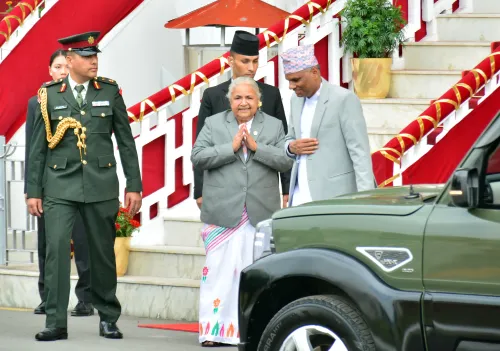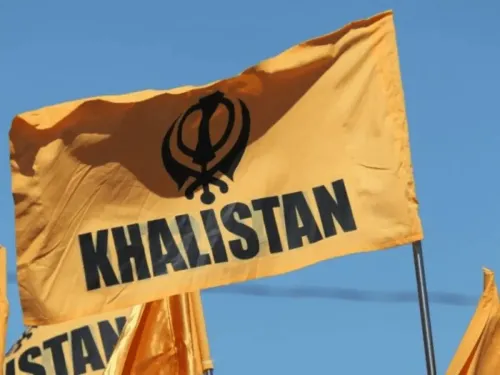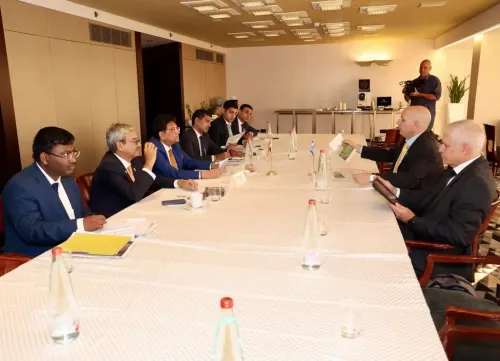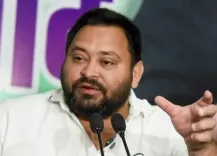Will European Leaders and Zelensky Meet Trump in Washington?
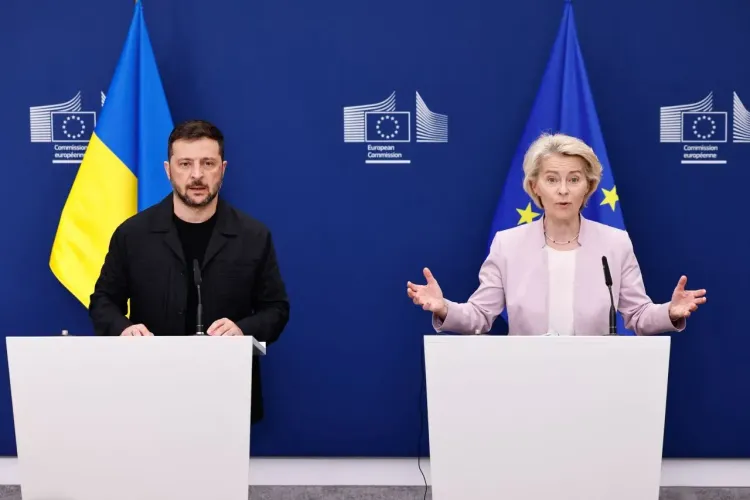
Synopsis
Key Takeaways
- European leaders join forces with Zelensky in Washington.
- Focus on security guarantees and territorial integrity for Ukraine.
- Meeting aims to prevent negative outcomes from previous encounters.
- Commitment to support Ukraine against Russian aggression is paramount.
- Unity among leaders is crucial for effective negotiations.
Brussels, Aug 18 (NationPress) European Commission President Ursula von der Leyen announced that she, along with other European leaders and Ukrainian President Volodymyr Zelensky, will be heading to Washington this Monday for discussions with US President Donald Trump.
"Following Zelensky's request, I will be attending the meeting with Trump and other European leaders at the White House tomorrow," von der Leyen shared on social media platform X.
The German government confirmed on Sunday that German Chancellor Friedrich Merz will also make the trip to Washington to join the discussions with Trump and Zelensky, as reported by Xinhua news agency.
Merz aims to address the ongoing peace negotiations, as stated in an announcement, focusing on security guarantees, territorial matters, and sustained support for Ukraine.
According to the French presidency, French President Emmanuel Macron will join Zelensky and other European leaders in Washington to enhance cooperation between Europe and the US.
Italian Prime Minister Giorgia Meloni is also set to attend the meeting at the White House alongside Zelensky and other European leaders, as reported by ANSA news agency.
Among the notable attendees will be British Prime Minister Keir Starmer, Finnish President Alexander Stubb, and NATO Secretary General Mark Rutte.
Leaders from the UK, France, Germany, Italy, and Finland are rallying around Zelensky following his exclusion from Trump's summit with Russian President Vladimir Putin last Friday.
Their commitment to stand with Zelensky at the White House on Monday aims to ensure a more productive meeting than the previous one in February, when Trump criticized Zelensky in a tense Oval Office exchange.
During his summit with Trump in Alaska, Putin agreed that the US and its European partners could provide Ukraine with security guarantees similar to NATO's collective defense mandate as part of a potential resolution to the ongoing conflict, according to special US envoy Steve Witkoff in an interview with CNN.
Ukraine and its European partners have condemned Putin's proposals as a stalling tactic to allow Russia to strengthen its military position, and they have expressed skepticism about Trump's land swap suggestion from the beginning.
The German government stated that the talks will cover security guarantees, territorial concerns, and ongoing support for Ukraine against Russian aggression, including maintaining pressure through sanctions.
The aim of Monday’s Washington discussions is to display a united front between Ukraine and its European allies, as emphasized by Macron on Sunday.
"If we show weakness today in front of Russia, we are paving the way for future conflicts," he stated.
Macron reiterated that the leaders in the “coalition of the willing,” who connected via video before heading to Washington, seek a strong and lasting peace in Ukraine and the respect of its territorial integrity.
The group visit highlights the importance of solidarity, given the negative reception Zelensky faced in February from Trump and US Vice-President J.D. Vance, who publicly chastised the Ukrainian leader.
While Zelensky has acknowledged Trump’s attempts to end the conflict, he cautioned on social media that "significant effort will be required to motivate Russia towards a lasting peaceful coexistence with its neighbors for decades."
Furthermore, the Ukrainian President has consistently maintained that Kyiv will not consider any territorial concessions to achieve a ceasefire, as mandated by Ukraine's Constitution.
Zelensky revealed that Putin has requested the transfer of all of Ukraine's eastern Donetsk region, which Kyiv currently retains one-third of.
In return, Russian forces would cease their assault in the Black Sea port regions of Kherson and Zaporizhzhia, where major cities remain under Ukrainian control.
Earlier in the month, the Ukrainian President reiterated that "Ukrainians will not surrender their land to the occupier" and emphasized that he lacks the authority to approve land exchanges. He noted that altering Ukraine's borders established in 1991 contradicts the nation’s Constitution.
Since Russia initiated a comprehensive invasion of Ukraine in February 2022, it has been gradually making territorial gains.
In the aftermath of the Alaska summit, Putin showed no signs of budging from Russia's longstanding demands, which include a veto on Kyiv's aspiration to join NATO.
He also cautioned both Ukraine and its European allies against "creating any obstacles" and urged that they should not disrupt the emerging progress through provocations or covert maneuvers.
Now, all eyes turn to Zelensky's upcoming discussions at the White House alongside European leaders.
US Secretary of State Marco Rubio noted that reaching a peace agreement will still require substantial effort.
"We are not on the verge of a peace deal," he stated. "While we have made headway in identifying potential areas of agreement, significant disagreements still exist. Thus, we have a long way to go."
"Ultimately, if a peace agreement is not reached, there will be consequences," Rubio warned in an interview with ABC News. "However, we are striving to prevent such outcomes, aiming instead for the preferable resolution of peace and the cessation of hostilities."

